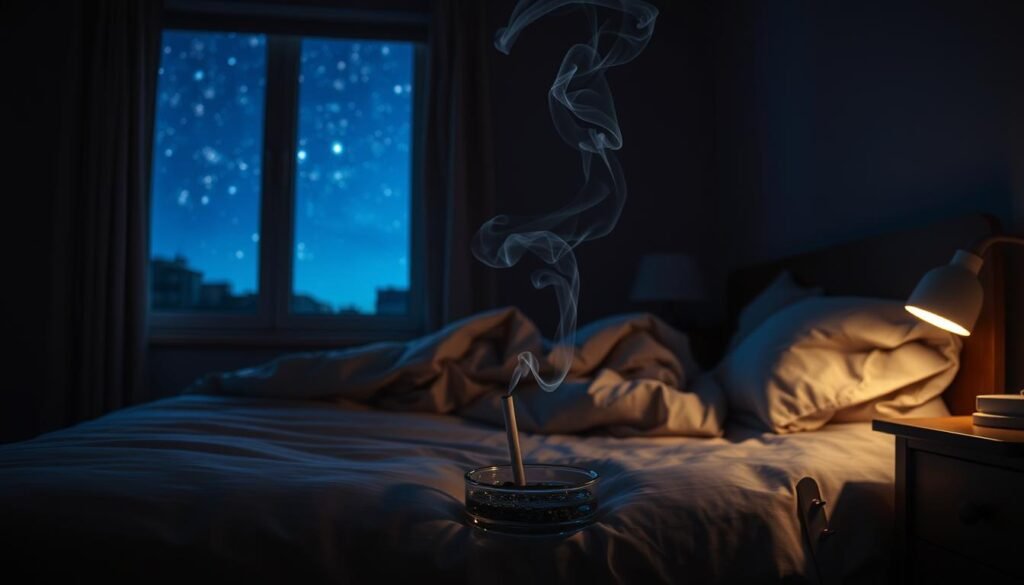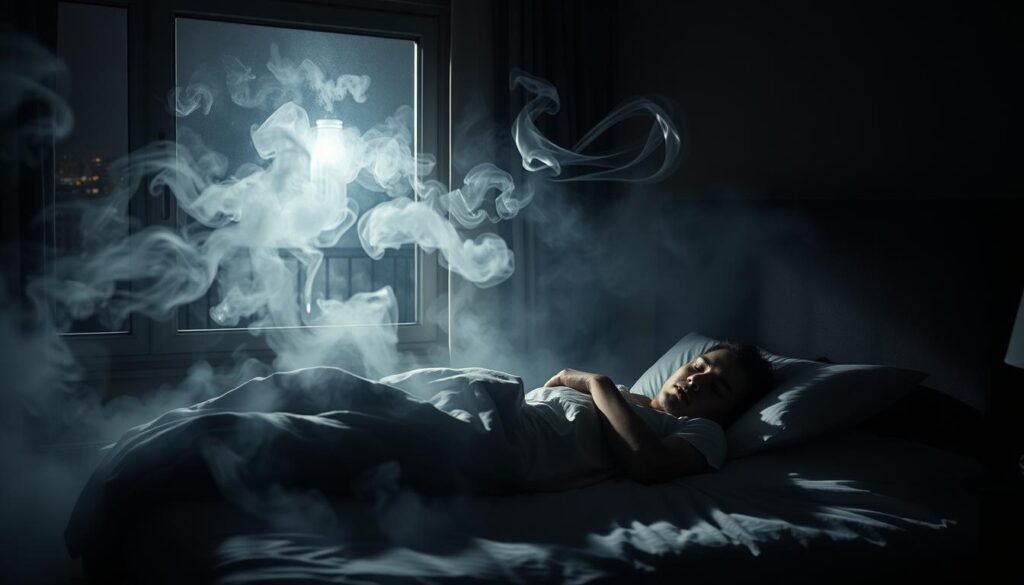Did you know smokers need up to 25 minutes more to fall asleep than non-smokers? This fact points to a bigger problem: effects of cigarettes on sleep are serious. Nicotine messes with brain chemicals that help us sleep. So, smokers often face insomnia and sleep issues. Studies show a clear link between smoking and sleep deprivation. Smokers usually have poor sleep quality and wake up often at night.
Smokers are more at risk for sleep apnea, adding to their health risks. They deal with nicotine cravings and a need for sleep. This makes it obvious that smoking can lead to insomnia. Knowing this helps in finding ways to improve sleep for smokers and those quitting.
The relationship between nicotine and sleep is complicated. But, it’s critical to talk about it. This can help smokers and doctors work towards better sleep.
Key Takeaways
- Smokers take between five and 25 minutes longer to fall asleep compared to non-smokers.
- Nicotine disrupts sleep quality, leading to insomnia and other sleep disorders.
- Smokers often experience fragmented sleep and less deep sleep.
- Smoking is linked to a higher occurrence of sleep apnea and daytime impairments.
- Understanding the effects of nicotine on sleep can guide better health choices.
Understanding Nicotine and Its Impact on the Body
Nicotine comes from tobacco and really affects our sleep. It makes it hard to fall asleep and stay asleep. Smokers often have trouble sleeping, with many adults facing insomnia. Tobacco and insomnia are closely linked, showing how nicotine messes with sleep.
What is Nicotine?
Nicotine is why cigarettes are addictive. It gets into the blood and heads straight for the brain. There, it makes the brain release dopamine, which feels good but ruins sleep. This leads to bad sleep and makes cigarette addiction and sleep quality worse.
How Nicotine Works in the Brain
When nicotine hits the brain, it releases chemicals. This might make you feel more awake. But, it ends up causing bad sleep habits. Smokers often can’t sleep well because of it. Many people have insomnia, but smokers have it worse. The link between nicotine and sleep shows why quitting is so hard.
We need to help those fighting cigarette addiction and sleep issues. Quitting smoking is tough and can make insomnia worse. So, they need lots of support to succeed.
Can Smoking Cause Insomnia? The Link Between Tobacco and Sleep Disorders
Many people wonder, can smoking cause insomnia? Research shows that smoking affects how well you sleep. Smokers often find it hard to fall asleep. They also wake up more during the night. This is because nicotine makes you feel more alert.
People who smoke a lot tell us they don’t sleep well. They spend too much time awake in bed. This means they don’t get enough good sleep. Getting good sleep is key to staying healthy. Starting to smoke young can make things worse.
Even if you don’t smoke, being around smoke can hurt your sleep. People exposed to secondhand smoke also don’t sleep well. This shows everyone needs a smoke-free environment.
For some, nicotine might seem to help sleep, especially for those with mood disorders like depression. This makes understanding smoking and sleep problems tricky.
Putting it all together, smoking and insomnia are closely linked. Nicotine affects sleep patterns and overall health. If you’re trying to stop smoking, treatments like nicotine replacement and therapy for insomnia can help. These can make your sleep better.
The Effects of Smoking on Sleep Quality
Smoking harms sleep deeply, messing up both how long and well you sleep. Many studies highlight smokers’ struggles with rest. They often get less sleep and have troubling sleep patterns.
This makes it hard for them to enjoy deep, restful sleep.
Reduced Sleep Duration
Smokers tend to sleep less than non-smokers. Those who smoke at night face even more sleep issues. A surprising 51% of people looking to quit smoking do so at night. This leads to more sleep problems and makes quitting harder.
This trend shows the strong link between smoking at night and not sleeping well. These smokers suffer more discomfort while trying to sleep.
Fragmented Sleep Patterns
Smokers often have broken sleep patterns. It may take them up to 25 minutes longer to fall asleep than non-smokers. They also wake up more during the night. Studies have found that sleep issues before trying to quit smoking predict failure.
Smokers, especially those who smoke at night, face a higher chance of sleep problems and failing to quit. Their health tends to get worse, which makes sleep issues more common.
Learning how smoking and sleep affect each other can help with quitting. For smokers struggling with sleep, learning more about the effects of cigarettes on sleep can be helpful. It’s good to improve sleep habits for better health.
| Study Aspect | Findings |
|---|---|
| Night Smoking | 51% of treatment-seekers smoke at night, correlating with greater sleep disturbance. |
| Sleep Disturbance | Pre-cessation disturbances predicted poor treatment outcomes. |
| Sleep Duration | Smokers sleep significantly less than non-smokers. |
| Quit Attempts | Night smokers are at increased risk for unsuccessful quit attempts. |
The Role of Nicotine as a Stimulant

Nicotine acts as a powerful stimulant, especially regarding sleep. Using nicotine before bed can make you more alert and disturb your sleep. Those who use nicotine often may face sleep issues and poor sleep quality.
How Stimulants Affect Sleep
Stimulants like nicotine can make sleeping well hard. Nicotine can cause:
- Increased time required to fall asleep.
- More frequent awakenings throughout the night.
- Reduced restful sleep.
Smokers may find it hard to sleep well due to nicotine. It disrupts their sleep cycles and causes unrest at night.
Timing of Nicotine Consumption and Sleep Onset
When you use nicotine affects how quickly you fall asleep. Consuming it before bed may cause:
- Disruption of natural sleep cycles.
- A higher chance of insomnia for regular smokers.
- More sleep issues when stopping nicotine, affecting sleep quality for quitters.
Starting to smoke in your teens could mean a bigger chance of insomnia later. Secondhand smoke can also harm sleep. Exercising and using Cognitive Behavioral Therapy for Insomnia (CBTi) might improve sleep during nicotine withdrawal.
Smoking and Sleep Architecture Disruption
Sleep architecture is crucial to understand how smoking affects our sleep. It looks at the pattern of our sleep stages. Smokers often see changes in this pattern, suffering from sleep problems.
What is Sleep Architecture?
Sleep comes in stages like light sleep, deep sleep, and REM sleep. Each stage is vital for our body and mind to rest and heal. Poor sleep architecture means worse sleep and more tiredness.
Impact on Sleep Stages
Studies show smoking messes with normal sleep. Smokers spend more time in light sleep and not enough in deep sleep. This leads to waking up often at night. As a result, smoking makes it hard to get good sleep. Smokers are 1.47 times more likely to have sleep problems than non-smokers.
Smoking, Sleep Apnea, and Other Sleep Disorders

Smoking and sleep disorders like obstructive sleep apnea are closely linked. Studies show that smoking greatly increases the risk of this problem. Smokers often have inflammation in their upper airways. This can block airways during sleep.
Connection Between Smoking and Sleep Apnea
Smokers are three times more likely to get obstructive sleep apnea than non-smokers. Older adults and people with thicker necks face a higher risk. This is because their airways are narrower. Men are more affected by sleep apnea than women.
Effects on Snoring and Breathing Issues During Sleep
Smoking can lead to regular snoring and breathing problems at night. Obstructive sleep apnea has serious health risks. These include a higher chance of car accidents, stroke, and insulin resistance. Being around secondhand smoke also increases the risk of sleep disorders.
| Risk Factor | Impact |
|---|---|
| Smoking | Increased likelihood of obstructive sleep apnea (3x) |
| Thicker neck circumference | Narrower airways, risk of apnea |
| Age | Higher risk of sleep apnea in older adults |
| Gender | Men are more likely than women to suffer from sleep apnea |
| Secondhand smoke exposure | Increased risk of sleep disorders, including sleep apnea |
Nicotine Withdrawal and Its Influence on Sleep
Quitting smoking is a big step forward for your health. But it can lead to nicotine withdrawal, affecting your sleep. This includes symptoms like restlessness and difficulty falling asleep. Many who stop smoking struggle to keep a steady sleep pattern.
Common Symptoms of Nicotine Withdrawal
Symptoms can peak just a few days after quitting. About 42% report insomnia during this time. The common signs are:
- Increased anxiety and irritability
- Difficulty concentrating
- Sleep disturbances
- Heightened cravings for cigarettes
There are many nicotine replacement options available. These include patches, lozenges, gums, and sprays. They help manage cravings. Nicotine patches, for example, might help improve sleep if worn at night.
Duration of Withdrawal Effects on Sleep Quality
Withdrawal effects can last from two weeks to months. This period may alter sleep patterns. Smokers usually experience more broken sleep and less deep sleep. Addressing these sleep issues can help people succeed in quitting. Adding exercises like walking or yoga can boost sleep quality.
Limiting caffeine and alcohol helps, as they can affect sleep. A calming nighttime routine and meditation aid in better sleep. Herbal teas such as chamomile may also help. By focusing on good sleep habits, quitting smoking becomes more beneficial for overall health.
Secondhand Smoke and Its Effect on Sleep

Exploring secondhand smoke shows a troubling link to sleep issues, especially for those who don’t smoke. Studies find that being around this smoke can lead to different sleep problems. This is a big worry for health.
Risks for Non-Smokers
People who don’t smoke but are around secondhand smoke struggle with sleeping well. A study found that many of these people had signs of secondhand smoke in their blood. This kind of exposure made it harder for them to fall asleep, breathe well during sleep, and disturbed their sleep in general.
Almost half of the people studied reported having two or more sleep disorder symptoms. This shows how secondhand smoke really affects sleep quality.
Impact on Sleep Disorders in Children
Kids are really at risk from the effects of secondhand smoke on sleep. Research shows that more than a quarter of kids have sleep problems. And the number goes up for kids living in smoky environments. Kids with asthma are even more affected if they’re around a lot of secondhand smoke.
They often face issues like breathing problems while sleeping, not sleeping well, and being very sleepy during the day. It’s clear that secondhand smoke and sleep problems in kids are connected. That’s why it’s vital to keep kids away from tobacco smoke to protect their sleep.
Benefits of Quitting Smoking on Sleep Quality
People who quit smoking notice big changes in how well they sleep. The path to stop smoking is hard, but the sleep rewards are great. After quitting, sleep becomes more stable which means better rest.
Improvements in Sleep After Cessation
Research shows quitting smokers have an easier time falling asleep. They also sleep more soundly. Even if quitting can cause temporary sleep issues, the long-term gains are worth it. Key improvements include:
- More N3 sleep, which is important for the body’s health.
- Fewer wake-ups at night, making for longer sleep cycles.
- Better sleep quality makes former smokers more alert and improves their mood during the day.
Strategies to Improve Sleep When Quitting
To sleep better while quitting, try these tips. They help with symptoms and improve sleep. Some effective methods are:
- Maintain a consistent sleep schedule: Going to bed and waking up at the same time each day helps your body’s clock.
- Create a calming bedtime routine: Calm activities before bed, like reading or meditating, prepare you for sleep.
- Avoid stimulants: Cutting back on nicotine and caffeine helps, especially before sleep.
- Consider relaxation techniques: Deep breathing and gentle yoga can reduce quitting-related anxiety.
- Seek professional support: Doctors can offer advice and tools to make quitting easier and manage symptoms.
Using these strategies enhances sleep during the quit. This leads to more restful nights and better overall life quality.
Conclusion
It’s proven that smoking and not sleeping well are connected. This means worries about smoking causing insomnia are real. Smokers often face trouble falling asleep and don’t sleep as soundly as those who don’t smoke. The chemicals in cigarettes, like nicotine, disrupt sleep and harm health over time.
Those who quit smoking see big sleep improvements. Their sleep gets deeper and it’s easier to fall asleep. Stopping smoking means better sleep and overall health. Studies, like one with Chinese men who stopped smoking, show big boosts in how well and long they sleep.
Quitting smoking is about more than just dropping a bad habit. It’s about improving your health and sleep. Stopping smoking helps you sleep better and live healthier. For more details, check out this study. It dives deep into how smoking affects sleep.